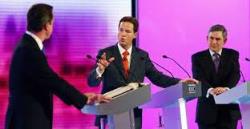Queue here for the bun-fight
Simon Campion-Brown on the General Election TV debate row
Yesterday afternoon the main UK broadcasters [the BBC, ITV, Channel Four and Sky] ‘called David Cameron’s bluff’ by announcing that they were going to proceed, as they had originally planned, with two televised electoral debates involving seven party leaders, plus one head-to-head version between Ed Miliband and … er … Mr Cameron, if he turns up – the implication being that, if Mr Cameron should decide not to turn up, he would be ‘empty chaired’.
For completeness only, some readers may need reminding that earlier this week, Number 10 had written to said broadcasters announcing that Mr Cameron’s ‘final offer’ on these electoral broadcasts was that he was prepared to appear in only one ‘seven leader’ debate (and that at some point prior to 30th March, i.e. before the official short campaigning period begins).
Today the Daily Telegraph features a lead political story reporting that senior Tories are furious with the BBC’s ‘institutional arrogance’ in seeking to dictate the terms for the electoral TV debates. To a cynical old hack like me, this smacks of Grade A ‘spin’ on behalf of Tory Central Office and/or the Tory Party electoral tricks department.
The British electorate may be as thick as two short planks, but we know exactly what this spat is all about.
 The 2010 General Election TV debates [in which some might say the Lib-Dem leader Nick Clegg, as part of a nod to the cosy Westminster stitch-up of political power and status quo, was erroneously allowed to take part] were widely regarded as a development for the better in terms of ‘transparency/improvement’ for the British political process.
The 2010 General Election TV debates [in which some might say the Lib-Dem leader Nick Clegg, as part of a nod to the cosy Westminster stitch-up of political power and status quo, was erroneously allowed to take part] were widely regarded as a development for the better in terms of ‘transparency/improvement’ for the British political process.
In retrospect, however, some rather more troubling conclusions were drawn by the political elite from the debates as they played out.
Firstly, it was perceived that the incumbent Prime Minister was on a hiding to nothing. This wasn’t just to do with the fact that in 2010 the incumbent was the unfortunate social misfit Gordon Brown – it was all about the general view that any Prime Minister, by appearing on an equal footing alongside his main competitor (or competitors) in such a debate, was inevitably ‘diminished’, in the sense that he (or she) would appear to be no more or less important or believable than any of the others. Ergo, the theory runs (in comparative terms) leaders’ TV debates simultaneously tend to enhance all the other leaders taking part and reduce the Prime Minister. Which has naturally led David Cameron and his advisers to question the point of him taking part in the 2015 TV debates on principle – he has nothing to gain and plenty to lose.
Secondly, there is a ‘presidential’ angle to TV debates generally – they tend to promote the notion that good looks and a personal manner that comes across as charismatic and television-friendly tend to have greater influence upon popular voting outcome than policy or political substance, as (some would maintain) has long been the case in the United States of America. Assuming that to be the case for this purpose, does this – should this – worry us, or not?
 Thirdly, by common consent, the real winner of the 2010 General Election TV debates – to the extent there was one at all – was Nick Clegg.
Thirdly, by common consent, the real winner of the 2010 General Election TV debates – to the extent there was one at all – was Nick Clegg.
The Lib-Dem leader scored heavily because he was photogenic and appeared to be self-deprecating, straight-talking, honest and … er … the new kid on the block. To the extent the other two (Brown and Cameron) presented themselves as stereotypical representatives of the tired old traditional party (Punch and Judy knockabout) style of party politics, he came across as a breath of fresh air. The result was that enough gullible voters decided to give Clegg and his crew a go that the Lib-Dems suddenly found themselves on an upward path strong enough to make them a player when the ‘smoked filled committee room’ negotiations began in the wake of the inconclusive 2010 General Election which gave no party a clear majority verdict.
So – let’s be straight about the current snarl-up.
Prime Minister Cameron (probably wisely) has no desire or intention to take part in a prolonged set of TV debates. Preferably he’d like there to be none at all, but as a fall-back (and face-saving) position he has adopted the line that one ‘seven leader’ TV debate is all he’s prepared to do.
In this context, any Tory outrage at the ‘institutional arrogance’ of the BBC [so what about the other broadcasters then?] is a pathetic attempt to simultaneously deflect criticism from the Prime Minister and blame others for the crisis that Tory High Command alone has itself created.
For one thing, yes – you cannot have the broadcasters dictating to the politicians over TV debates – but equally, you cannot have the Prime Minister dictating to everyone else about them either.
Or at the very least, the Prime Minister shouldn’t be allowed to do so.
Unless, of course, he chooses to skirt around the entire circus by adopting a fall-back position whereby he either turns the TV debate issue into a ‘game show’-style farce bordering upon the ridiculous (viz. proposing just one ‘seven leader’ debate all over in 90 minutes scenario) and/or refuses to take part in any TV debate at all.
Oh … hang on, I get it … a bit like what he’s just done.

